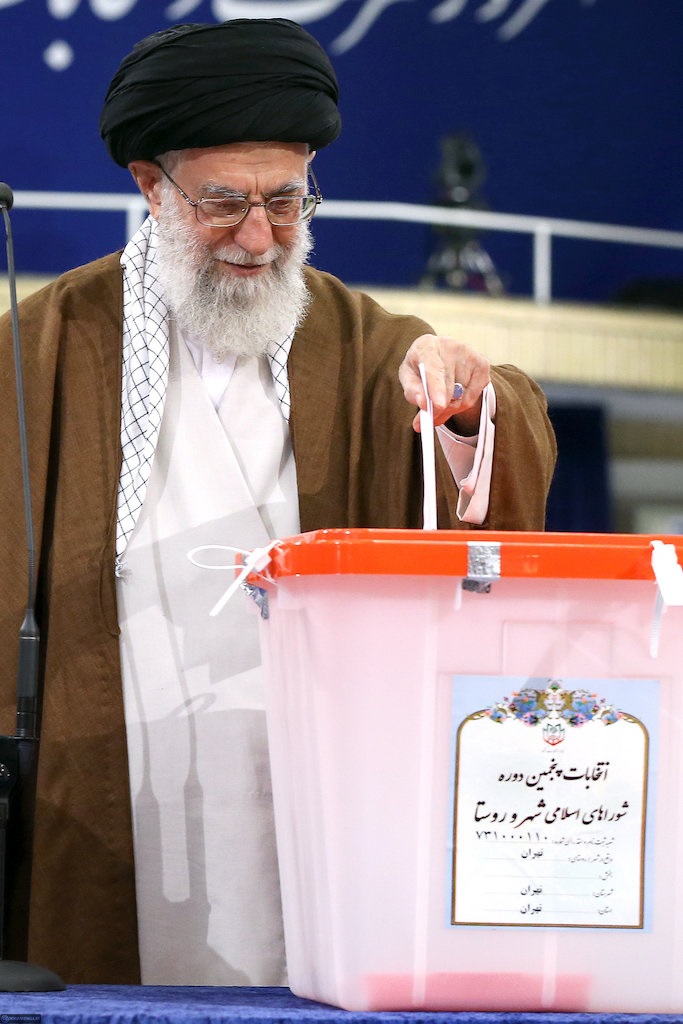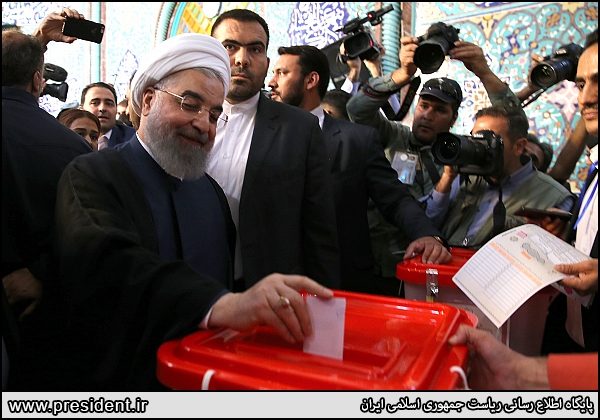Iranians began to form long lines soon after polling stations opened at 8:00 a.m. They cast ballots for president as well for municipal councils nationwide. Some 56.5 million people were eligible to vote, including 1.3 million first timers, according to the Interior Ministry. The turnout in 2013 was 72 percent. Initially, election officials reported that 2017’s turnout seemed larger than in 2013.
Officials, Former Officials and Candidates Vote
Supreme Leader Ayatollah Ali Khamenei symbolically cast the first vote. "Elections are very important and the fate of the country is in the hands of all people," he said.

President Hassan Rouhani also voted early in the day. “Today is a very blessed day for the people of Iran and the people actually have the right to choose the future of their country, doing this with their attendance and presence,” he said at Hosseinieh Ershad in Tehran.

Rouhani’s rival, Ebrahim Raisi, voted in south Tehran, a poorer district of the capital. Throughout his campaign, the hardliner painted himself as the champion of Iran’s poor.
Ebrahim Raisi casts his vote in Shah Abdulazim, south of #Tehran.#IranElections2017 pic.twitter.com/T22bxPM54q
— Iranian Diplomacy EN (@irdenglish) May 19, 2017
The media and voters jostled to take a photograph of former reformist President Mohammad Khatami, who has been banned from media appearances and travel, as he cast his ballot. Some people chanted “Long live Khatami.”
#IranElections2017: Influential reformist leader Mohammad Khatami at Hosseinieh Ershad polling station. Media banned from mentioning him.. pic.twitter.com/p2pNEjzpvp
— IranHumanRights.org (@ICHRI) May 19, 2017
Foreign Minister Mohammad Javad Zarif was swarmed by supporters when he went to vote. People cheered him and tried to take pictures of him with their cell phones. Zarif headed the negotiations that led to the landmark nuclear deal in 2015.
حضور محمدجواد ظریف در حسینیه #جماران برای شرکت در انتخابات#انتخابات۹۶ pic.twitter.com/X9Dk6WoJBc
— خبرگزاری تسنیم (@Tasnimnews_Fa) May 19, 2017
Qassem Soleimani, the commander of the elite Qods Force of the Revolutionary Guards, was photographed at a polling station. He was reportedly accompanied by a veteran of the Syrian war. Iran has provided the Assad regime with military and financial support since the conflict broke out in 2011.
#IRGC Qods Force cmdr Qasem Soleimani arrives 2 vote accompanied by Hassan Mousavi Nejad who was severely injured in Aleppo, Syria. pic.twitter.com/Yjd7GZxFTx
— raz zimmt (@RZimmt) May 19, 2017
Former Parliamentary Speaker Mehdi Karroubi, who said he would vote for Rouhani if he was allowed to vote, was able to cast a ballot, according to his son. Karroubi ran for president in 2009 and has been under house arrest since 2011 for supporting the Green Movement protests. His supporters shouted his name at Rouhani rallies during the 2017 campaign.
Karroubi, an opposition leader under house arrest since 2011, just voted in #IranElections2017, his son told me. pic.twitter.com/B7Gwmt3Ler
— Bozorgmehr Sharafdin (@bozorgmehr) May 19, 2017
Minorities Vote
#Jewish and Christian #Iranians joining millions of others in this day of voting. #iranElection2017 pic.twitter.com/rTdle3ZQD5
— Bahman Kalbasi (@BahmanKalbasi) May 19, 2017
Molavi AbdolHamid prominent leader of Sunni community SW Iran
— Mohammad Hashemi (@mohamadhashem2) May 19, 2017
People in Sistan Baluchistan traditionally vote reformists#IranElection2017 pic.twitter.com/EyBzXh8f5L
Expatriate Voting
Deputy Foreign Minister for Consular, Parliamentary and Iranian Expatriates’ Affairs Hassan Qashqavi previously announced that Iranian expatriates could vote in 103 countries. Iran arranged 279 stations at 132 embassies and consulates for the election. Qashqavi said that approximately 2.5 million Iranians living abroad were eligible to vote in 2017.
More than 50 polling stations were set up across the United States. Iranians in the Washington D.C. area cast their votes at the Iranian Interests Section at the Pakistani Embassy.
Iranians casting votes in presidential election in Washington DC.#Iran #IranElections2017 pic.twitter.com/qxsTrsZHG5
— Abas Aslani (@AbasAslani) May 19, 2017
An Iranian voter in Cambridge MA, one of 55 places where Iranians can vote in the US today. #iranelections2017 pic.twitter.com/a2FzXSMA9U
— Jason Rezaian (@jrezaian) May 19, 2017
Hardline Afsaran shares pic of ultra-conservative Iran Election candidate Raisi supporter in front of Trump Tower. #Iran #IranElection2017 pic.twitter.com/zSNJFPqtbY
— Hanif Zarrabi-K. (@hanifzk) May 19, 2017
Oscar-winning director Asghar Farhadi and award-winning actress Fatemeh Motamed Arya voted in Cannes, France. Farhadi had endorsed Rouhani.
اصغر فرهادی و ایرانیها در کن #رای دادند/ایسنا pic.twitter.com/YZ48QzRCBL
— خبرآنلاين (@khabaronlinee) May 19, 2017
Polls Open Overseas in Iran's 12th Presidential Election #IranElections2017 https://t.co/F4dvQ6MIBf pic.twitter.com/fAlhDgOLb0
— Fars News Agency (@EnglishFars) May 19, 2017
#Iran Presidential election is tomorrow but Iranians in New Zealand are already casting their votes. #Oakland pic.twitter.com/3NDBzMrQq7
— Bahman Kalbasi (@BahmanKalbasi) May 19, 2017
Turnout
Some 63,500 polling stations were opened across the country. Electronic voting machines were used for city and village council elections at 9,740 polling stations. By mid-afternoon, some 20 million people had voted, according to the Interior Ministry. Poll hours was extended from 6:00 p.m to 8:00 p.m and again to 10:00 p.m. The interior minister eventually extended the vote until midnight but said there would be no more extensions.
The longest lines I have ever seen in 15 years of reporting here. This is Husseiniye Ershad where most foreign reporters and state tv are. pic.twitter.com/2W3BfgIdSJ
— Thomas Erdbrink (@ThomasErdbrink) May 19, 2017
Uptown in Shahrak-e Gharb long lines and these 3 dudes who brought chairs. They waited 3 hours and are voting to prevent a Raisi victory. pic.twitter.com/0CH5h9HyVY
— Thomas Erdbrink (@ThomasErdbrink) May 19, 2017
#Photos: Iranians vote in ‘important’ presidential electionhttps://t.co/neu5x4097g#IranElections#IranElections2017 https://t.co/H4CLdQ32w4
— Iran (@Iran) May 19, 2017
Iranians Queue up to Vote in Presidential & City Council Elections #IranElections2017 https://t.co/JgWSM1AFRx pic.twitter.com/KDgA47LFcY
— Fars News Agency (@EnglishFars) May 19, 2017
Anti-Rouhani car: "Rouhani get your congratulations to Raisi letter ready!" #IranElections2017 pic.twitter.com/0abJVlmQcu
— Holly Dagres (@hdagres) May 19, 2017
Iran’s first female Olympic medallist - Kimia Alizadeh - votes in #IranElections2017 pic.twitter.com/drp2pvDX1O
— IranWire (@IranWireEnglish) May 19, 2017
Twins waiting in a polling station line to cast their ballots in #IranElections2017.#Iran pic.twitter.com/8kIcRPM9XV
— Abas Aslani (@AbasAslani) May 19, 2017
Some brides and grooms go to polling stations to vote.#Iran #IranElections2017 pic.twitter.com/blxBmjb51l
— Abas Aslani (@AbasAslani) May 19, 2017
One of my personal favorites from today's elections in #Iran. #IranElections2017 pic.twitter.com/kO2TuWOCLs
— Reza H. Akbari (@rezahakbari) May 19, 2017
EXCLUSIVE PHOTOS: long lines as Iranians cast their votes in #IranElections2017
— IranWire (@IranWireEnglish) May 19, 2017
All Iran News & Analysis at: https://t.co/4a4z0E64F5 pic.twitter.com/A44KuVqCRU
Hamid Baghaei, who was disqualified from running for president, writes in the name of his former boss, Mahmoud Ahmadinejad. pic.twitter.com/crWRdUbZRS
— Arash Karami (@thekarami) May 19, 2017
Polls will be closed in 30 minutes, yet so many still in line to vote. #IranElections2017 pic.twitter.com/FfoKLktaEm
— Sadegh Ghorbani (@GhorbaniSadegh) May 19, 2017
Polls close in #Iran while Interior Ministry announcing that over 40 million cast ballots in #IranElections2017. Counting has started.
— Abas Aslani (@AbasAslani) May 19, 2017
Raisi Campaign Alleges Voting Violations
Raisi’s campaign staff sent a letter to the Election Supervisory Board listing possible violations and requesting that the body intervene. The alleged violations included ballot shortages in smaller towns and cities, the “illegal presence and propaganda” of Rouhani’s staff and supporters, a lack of information about Raisi announced at polls before 3:00 pm, limited access to polling places, and issues with observers.
اطلاعیه ستادمرکزی #رئیسی:
— Alireza Mataji (@alimat1979) May 15, 2017
«باتوجه به تخلفات گسترده ازسوی استانداریها، فرمانداریها و بخشداریها، مستندات رابه س.مرکزی با فوریت ارسال کنید.» pic.twitter.com/SVIR1FR343
Raisi met with Interior Minister Abdolreza Rahmani Fazli to discuss the alleged irregularities. Afterward, Raisi said that he that the election mechanisms were “reassuring.” The Guardian Council’s spokesperson said that it looked into the issue of ballot shortages and did not find a problem.
Raisi:Mechanism of election in #Iran is reassuring. If the mechanism implemented well, no problem comes up.Some problems were reported to me pic.twitter.com/b6gi0B2Hob
— Abas Aslani (@AbasAslani) May 19, 2017
Chief Justice of Tehran Province Gholam Hossein Emaili told Tasnim News Agency that authorities had arrested more than 100 people in Tehran for election-related offenses since the polls opened. Most of the fraudulent activities were related to the municipal elections.
Internet Access Not Curtailed More than Usual
On the eve of #IranElection, for first time in recent electoral history, Iran has not interfered with Internet access–even privacy tools. pic.twitter.com/7Bx43gItgs
— Collin Anderson (@CDA) May 19, 2017
